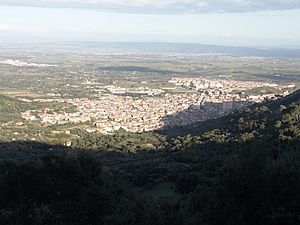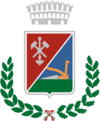Guspini facts for kids
Quick facts for kids
Guspini
Gùspini
|
||
|---|---|---|
| Comune di Guspini | ||
 |
||
|
||
| Country | Italy | |
| Region | Sardinia | |
| Province | South Sardinia | |
| Frazioni | Montevecchio, Sa Zeppara | |
| Area | ||
| • Total | 174.67 km2 (67.44 sq mi) | |
| Elevation | 126 m (413 ft) | |
| Population
(31 December 2017)
|
||
| • Total | 11,725 | |
| • Density | 67.127/km2 (173.857/sq mi) | |
| Demonym(s) | Guspinesi | |
| Time zone | UTC+1 (CET) | |
| • Summer (DST) | UTC+2 (CEST) | |
| Postal code |
09036
|
|
| Dialing code | 070 | |
| Patron saint | St. Nicholas of Myra | |
| Saint day | December 6 | |
Guspini (called Gùspini in the Sardinian language) is a town in western Sardinia, Italy. It has about 12,000 people and is part of the Province of South Sardinia. Guspini is about 62 kilometers (38 miles) from Cagliari, the capital city of Sardinia.
In the past, important minerals like galena and sphalerite were dug up from mines near Guspini, especially in places like Montevecchio. Today, the people of Guspini mostly work in farming, tourism, and small to medium-sized businesses. The area around Guspini is also home to ancient nuraghes and the old Phoenician-Punic site of Neapolis.
Contents
Guspini's Long History
The first signs of people living in the Guspini area are from before the Nuragic period. This means humans were here a very long time ago! We have found traces of Nuragic, Phoenician-Punic, Byzantine, and Roman settlements.
Medieval Times
The town of Guspini has a medieval layout. The Church of Santa Maria of Malta is the oldest building from this time. It was built by knights of the Maltese order. In the Middle Ages, Guspini was part of the Giudicato of Arborea. The rulers of Arborea had a castle built around 1100 on a nearby hill called Mount Arcuentu.
Mining History
From the 1800s onwards, Guspini's history was closely connected to the Montevecchio mines. These mines were very important for the region's economy.
Interesting Places to See
Guspini has many interesting places, from old churches to ancient ruins and natural wonders.
Religious Buildings
- Church of San Nicola di Mira: This church was built in the early 1600s in a late Gothic style. It has a beautiful round window on its front.
- Church of Santa Maria of Malta: Built in the 900s, this church is in the Romanesque style. It was once part of a monastery.
- Church of San Pio X: This is a more modern church, built in 1966.
- Church of San Giovanni Bosco: Another modern church, built in 1977.
Ancient Archeological Sites
Guspini is rich in ancient history, with sites from different periods.
Pre-Nuragic Sites
- Perdas Longas menhirs: These are tall, upright stones, like ancient monuments.
- Genna Prunas menhir: Another ancient standing stone, found near the sacred well called Sa Mitza de Nieddinu.
- Domus de Janas di Bruncu Maddeus: These are ancient tombs carved into rock, often called "fairy houses." They are near the Nuraghe Bruncu e s'Orcu.
Nuragic Sites
The Nuragic civilization built unique stone towers called nuraghes.
- There are more than 30 nuraghes in the area! Some of the best-preserved ones are Nuraghe Saurecci and Nuraghe Melas.
- There are also two sacred wells:
- Sacred well Sa Mitza de Nieddinu: This well dates back to 1200-900 BC.
- Sacred well of Is Trigas: Another important ancient well.
The most interesting archeological site is the ancient city of Neapolis. It was first a Phoenician-Punic city and later became a Roman city.
Mines
The area around Guspini is famous for its old mines, especially the Montevecchio mines. These mines were once very active.
- Among the East mines, you can find:
- Piccalinna mine.
- Sant'Antonio mine.
- Sciria mine.
- Among the West mines, you can find:
- Casargiu mine.
- Sanna mine.
- Telle mine.
Natural Wonders
Guspini also has some amazing natural features.
- Basalt Columns: You can find columns of basalt rock right inside the town. Basalt is a type of volcanic rock.
- Sa rocca incuaddigada: This name means "The mounted rock" in Sardinian. It's a huge granite rock sitting on the side of Mount Santa Margherita. Two water springs, Sa Tella and Sattai, are also found here.
See also
 In Spanish: Guspini para niños
In Spanish: Guspini para niños
 | Emma Amos |
 | Edward Mitchell Bannister |
 | Larry D. Alexander |
 | Ernie Barnes |


